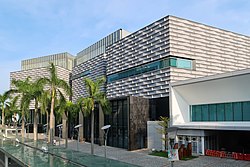Hong Kong Museum of Art
 | |
 Hong Kong Museum of Art in August 2019. | |
 Interactive fullscreen map | |
| Established | 2 March 1962 |
|---|---|
| Location | 10 Salisbury Road, Tsim Sha Tsui, Kowloon, Hong Kong |
| Coordinates | 22°17′37″N 114°10′19″E / 22.29361°N 114.17194°E |
| Type | Art museum |
| Collection size | 17,000 (2020) |
| Owner | Leisure and Cultural Services Department |
| Website | hk |
| Hong Kong Museum of Art | |||||||||||
|---|---|---|---|---|---|---|---|---|---|---|---|
| Traditional Chinese | 香港藝術館 | ||||||||||
| Simplified Chinese | 香港艺术馆 | ||||||||||
| |||||||||||



The Hong Kong Museum of Art (HKMoA) is the first and main art museum of Hong Kong, located in Salisbury Road, Tsim Sha Tsui. It is a public museum managed by the Leisure and Cultural Services Department of the Hong Kong Government. HKMoA has an art collection of over 17,000 items. Admission is free for permanent exhibitions.[1] Its rival is the non-government-managed Hong Kong Arts Centre. These two museums are considered to be the top two art museums in Hong Kong that dictate the discourse of art in Hong Kong.[2][3]
It has an extended branch, the Flagstaff House Museum of Tea Ware, at the Hong Kong Park in Central.[4]
History
[edit]The museum was established as the City Hall Museum and Art Gallery in the City Hall in Central by the Urban Council on 2 March 1962.[5] This was split into the Hong Kong Museum of History and the Hong Kong Museum of Art in July 1975.
The Museum of History moved to Kowloon Park in 1983.[6] Before leaving City Hall in 1991, the art museum occupied the 8th (rear portion), 9th, 10th, and 11th storeys of the High Block.[7] These floors now house a public library. In 1991, it was moved to the present premises at 10 Salisbury Road, near the Hong Kong Cultural Centre and the Hong Kong Space Museum, in Tsim Sha Tsui.
The new museum was formally inaugurated by Governor Chris Patten on 11 September 1992.
The museum closed on 3 August 2015 for a $400 million expansion and renovation.[8][9][10] It reopened on 30 November 2019.[11]
Exhibitions
[edit]The museum changes its displays regularly. The exhibitions in the museum are mainly of paintings, calligraphy and sculpture from Hong Kong, China and other parts of the world. It has cooperated with other museums as well.
From 25 May to 4 July 1962, the museum (then still named the Hong Kong City Hall Museum and Art Gallery) held the major exhibition, Hong Kong Art Today. It was significant as the first exhibition with Hong Kong art as its theme.[12] The exhibition also reflected how naturalism in art had become passé and that abstract art was favoured at that moment in time.
Since 1975, the museum has hosted the Hong Kong Art Biennial Exhibition featuring the work of contemporary Hong Kong artists.[13] It was renamed the Hong Kong Contemporary Art Biennial Awards in 2009.[14]
Transportation
[edit]The museum is within walking distance of both East Tsim Sha Tsui station and Tsim Sha Tsui station of the Mass Transit Railway (MTR). It is even closer to the Tsim Sha Tsui Ferry Pier, with services to Wan Chai and Central.
See also
[edit]References
[edit]- ^ "New initiatives for the museums of the Leisure and Cultural Services Department". Hong Kong Museum of Art. Archived from the original on 8 October 2019. Retrieved 8 October 2019.
- ^ 黎家怡 (5 August 2020). "【何慶基榮休專訪】志趣逢時 回流策展教學逾三十年". 立場新聞. Archived from the original on 9 August 2020. Retrieved 29 December 2021.
何慶基[Professor Oscar Ho]指,城內藝術論述當時主要由香港藝術館和香港藝術中心分庭抗禮。前者比較「保守」,後者較受年輕人關注,「當時藝術中心話俾你聽乜嘢係藝術,嗰啲嘢就會被視為藝術」
- ^ 陶穎康; 陳安琪 (2015). "陳贊雲訪談錄 [Interview of Michael Chen, 20 December 2013]". In 黎明海; 文潔華 (eds.). 與香港藝術對話:1980-2014. Joint Publishing. pp. 274–275. ISBN 9789620436178.
(採訪者陶穎康、陳安琪):香港藝術中心一直被不少人視為與象徵建制的香港藝術館抗衡的場所. 你到香港藝術中心出任畫廊總監時, 又有何定位? 陳贊雲[Michael Chen]: 在香港藝術中心任職這五年間, 我不時想到這問題. 對比得到政府支持的香港藝術館,[...]
- ^ "Flagstaff House Museum of Tea Ware". Hong Kong Tourism Board. Archived from the original on 9 February 2023. Retrieved 10 July 2023.
- ^ Tsang, Reynold (2024). "The 'death' and 'rebirth' of museums in colonial Hong Kong: three decades of community endeavours to restore reputation and culture, 1933–1962". Museum History Journal. Taylor & Francis. doi:10.1080/19369816.2024.2409263.
- ^ "Hong Kong Museum of History to celebrate 40th anniversary with public". Information Services Department. 16 July 2015. Archived from the original on 7 February 2023.
- ^ "Hong Kong Museum of Art, Designation of Premises as a Museum and as a Civic Centre". Urban Council. 5 October 1991. Retrieved 22 January 2015.
- ^ Chow, Vivienne (14 February 2013). "Museum of Art to get a facelift". South China Morning Post. Retrieved 22 January 2015.[permanent dead link]
- ^ "Expansion and Renovation of the Hong Kong Museum of Art" (PDF). Legislative Council Panel on Home Affairs. 12 May 2014. Retrieved 22 January 2015.
- ^ "Breaking News! Hong Kong Museum of Art is about to Close for a Makeover!". Hong Kong Museum of Art. Archived from the original on 15 July 2018. Retrieved 16 July 2015.
- ^ Sun, Fiona (30 November 2019). "Hong Kong Museum of Art to reopen to public on Saturday after four years of expansion and renovations". South China Morning Post.
- ^ 鄭, 蕾 (2016). 香港現代主義文學與思潮. 香港: 中華書局(香港)有限公司. ISBN 978-9888420827.
- ^ Lau, Joyce (7 July 2010). "Global Gloss, but Where Is Hong Kong's Local Art Scene? (Published 2010)". The New York Times. Retrieved 21 November 2020.
- ^ Asia Art Archive. "Hong Kong Contemporary Art Biennial Awards 2009 record for Hong Kong Museum of Art exhibition catalog". aaa.org.hk. Asia Art Archive. Retrieved 21 November 2020.
External links
[edit]- Official website
- Hong Kong Museum of Art within Google Arts & Culture
 Media related to Hong Kong Museum of Art at Wikimedia Commons
Media related to Hong Kong Museum of Art at Wikimedia Commons
